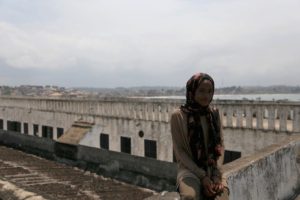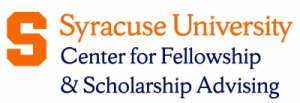The Gilman Scholarship Experience with Hatou Camara

“The Gilman scholarship program is by far the largest single study abroad scholarship opportunity in the country. Scores of SU students have won substantial funding through Gilman and have benefited from the opportunity to travel internationally and develop into global citizens through coursework, internships, community engagement, language study, and cultural immersion. Being the recipient of a national scholarship is also a resume-builder and can serve as a springboard to winning other scholarships, such as Fulbright.” – Mary Fedorko, Senior Admissions Counselor at SU Abroad and SU Gilman Campus Representative
The Gilman Scholarship Program aims to diversify the kinds of students who study and intern abroad and the countries and regions where they go by offering awards to U.S. undergraduates. The Bureau of Educational and Cultural Affairs of the U.S. Department of State sponsors the scholarship program. They believe the people of the United States and the people of other countries together can promote friendly, sympathetic, and peaceful relations.
Hatou Camara, ’17, is a recent recipient of the Gilman Scholarship. Last summer with the help of the Gilman Scholarship, she was able to participate in the SU Abroad program Survey of Current Issues in African Migration: A Fieldwork Practicum. While abroad, she traveled, explored and completed an internship. We asked Hatou some questions about her experience:
Why did you apply for the Gilman Scholarship?
I applied for the Gilman Scholarship because I wanted additional funding to support my study abroad program, Survey of Current Issues in African Migration: A Fieldwork Practicum, in Ghana. It was crucial for me to apply to a few different scholarship programs, and the Gilman seemed like both a great opportunity and great fit. I’ve also heard from other students who appreciated having the scholarship to fund their studies.
What was your experience in Ghana? What was the best part of your experience? If there was a bad part, what was it?
My summer in Ghana was a highlight of my SU experience. My family is from The Gambia, so it was really nice to be back in West Africa again. Apart from the delicious food, I enjoyed everyday interactions with Ghanaians both in Accra, and the Volta region, the two sites of the internship. During the first week in Accra, my intern group attended a week long orientation at the International Organization for Migration and we were given a crash course on what to expect living in Ghana, in terms of language, communication, security, customs and an overview of internship goals and objectives.
Tell us about your travel experience while in Ghana.
After orientation, we spent the next three weeks in Dodome Tsikor, a village in the Ho West District of the Volta Region. While there, we observed counter-trafficking campaigns in Dodome Tsikor and four other communities in the Ho West District. In each community we visited, we accompanied local volunteers to different programming. The warmth we encountered in these communities, particularly in the one we stayed in for three weeks, was definitely unmatched anywhere else.
What was it like having an internship abroad?
My intern group grew closer together during those first three weeks too, partly because we participated in community activities and devised our own community action plan. For the next two weeks, and the main focus of the internship, we interviewed twelve Ghanaian returnees in and around Accra. IOM staff members in the Assisted Voluntary Return and Reintegration (AVRR) program. Listening to the stories of migrants was illuminating. You hear about the migration “crisis” in the news, but it’s always important to put experiences in perspective. I wish the program were longer and if it were possible, I wouldn’t hesitate to do the program again.
What did you learn by being a Gilman Scholar?
As a Gilman Scholar I learned how to make the most of my study abroad experience. In doing an internship, I realized that the experience was much more than just going into the office. I had to extend myself, become comfortable, and try to make myself feel at home, whether in the Accra or in the Volta Region. I was able to grow personally by becoming more independent and not try to overanalyze every situation. Through this, I was able to fully immerse myself in the experience.
How are you spreading the word about the Gilman program at Syracuse University?
Mary Fedorko of SU Abroad reached out to me to speak on my study abroad experience at a Gilman interest session. I talked about the reasons I studied abroad, why I applied for Gilman and my overall experience in Ghana.
How are you sharing your experience at home?
This past weekend I went back home to NYC and gave a presentation on studying abroad. I’m a board member of an organization called the Smiling Coast Women Empowerment Network and we put on a higher education event every fall. The study abroad presentation was a great addition to the panels, discussions, and presentations. We had about 100 high school and college students present, so I hope everyone realizes how study abroad can be both enriching and feasible.
What advice do you have for future applicants?
When applying for the Gilman, start early! I gave myself enough time to go through two full drafts and have someone at CFSA and Study Abroad look over them. I suggest reading the personal statement questions carefully. Gilman selectors are particular about applicants answering each question adequately. It’s also a good idea to draft answers to each question first, and then structure them into an essay format. Lastly, don’t be afraid to mention why you’re a good fit for Gilman and express the specific ways in which the study abroad experience will aid your personal, academic and professional goals.
